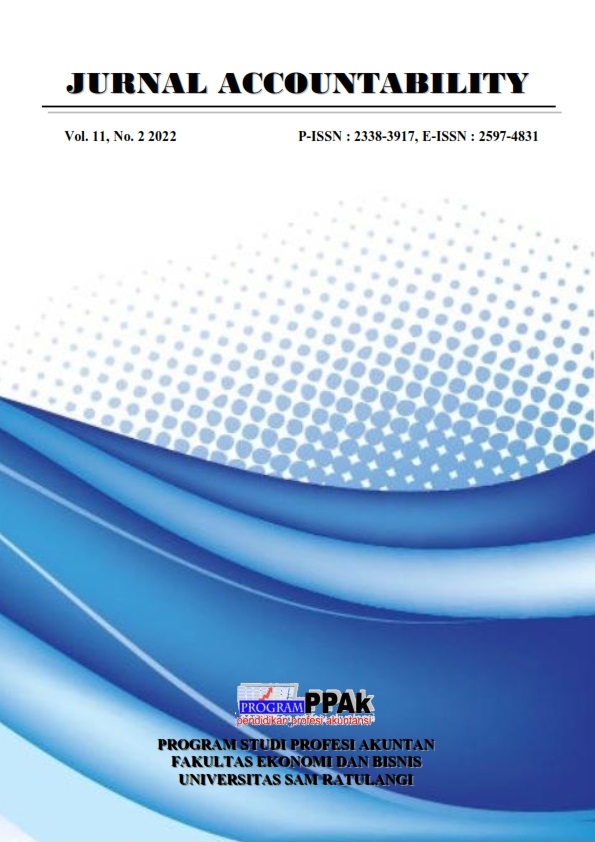ANALYSIS OF THE UTILIZATION OF THE ADMINISTRATIVE EXEMPTION OF HOTEL TAX, RESTAURANT TAX, AND ENTERTAINMENT TAX IN ACCORDANCE WITH MAYOR REGULATION NO. 42 YEAR 2021 BITUNG CITY
Abstract
Tax sanctions are divided into two types, namely administrative sanctions and criminal sanctions. The taxpayer's duty to pay hotel, restaurant, and entertainment taxes in the pandemic era is felt to burden the community, especially those in the city of Bitung. Therefore, the local government issued a policy through Mayor Regulation No. 42 in 2021 in terms of granting exemption from administrative sanctions. The purpose of this study was to determine the use of the exemption from administrative sanctions for Hotel Tax, Restaurant Tax, and Entertainment Tax in Bitung City in accordance with Mayor Regulation No. 42 in 2021. The analytical method used in this study is a qualitative descriptive analysis. The results of this study indicate that there are 22 Restaurant Taxpayers, 5 Hotel Taxpayers, and 4 Entertainment Taxpayers who take advantage of the exemption of sanctions. For those who do not take advantage, there are 15 Restaurant Taxpayers and 4 Hotel Taxpayers with constraints of lack of information and economic difficulties. The method of paying taxes during the exemption period is still the same as the normal payment, but the Taxpayer is no longer subject to administrative sanctions.
Downloads
Published
Issue
Section
License
Copyright (c) 2023 Madeleine Monica Roslin Ole, Jenny Morasa, Sonny Pangerapan

This work is licensed under a Creative Commons Attribution-NonCommercial 4.0 International License.
The articles published in Jurnal Accountability are licensed under Creative Commons Attribution-NonCommercial 4.0 International with authors as copyright holders.
Â

This work is licensed under a Creative Commons Attribution-NonCommercial 4.0 International License.
Â
- Share — copy and redistribute the material in any medium or format.
- Adapt — remix, transform, and build upon the material.
- The licensor cannot revoke these freedoms as long as you follow the license terms.
- Attribution — You must give appropriate credit, provide a link to the license, and indicate if changes were made. You may do so in any reasonable manner, but not in any way that suggests the licensor endorses you or your use.
- NonCommercial — You may not use the material for commercial purposes.
- No additional restrictions — You may not apply legal terms or technological measures that legally restrict others from doing anything the license permits.
- You do not have to comply with the license for elements of the material in the public domain or where your use is permitted by an applicable exception or limitation.
- No warranties are given. The license may not give you all of the permissions necessary for your intended use. For example, other rights such as publicity, privacy, or moral rights may limit how you use the material.


